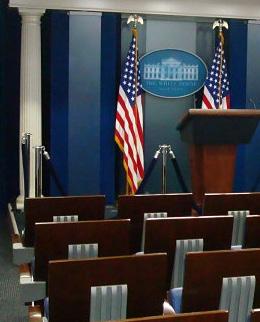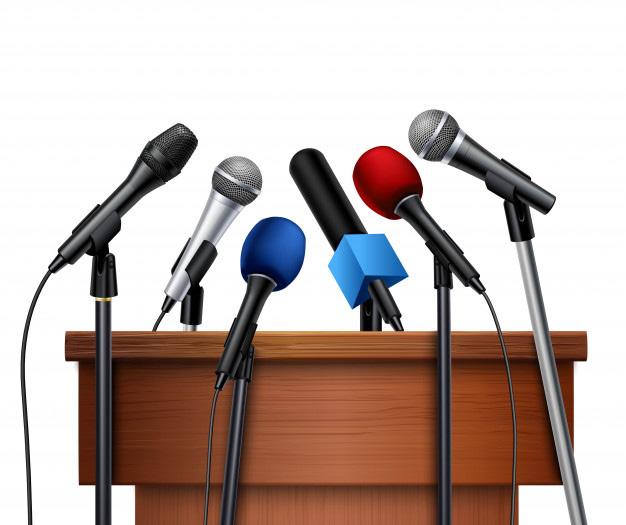
5 minute read
How Our Inner “Press Secretary” Tells Delusional Stories
How Our Inner Tells Delusional Stories “Press Secretary”
b ark Kit ric k and ark Lewis
We listen to the President’s Press Secretary with skepticism. We’re skeptical because we know the Press Secretary’s job is to justify the President’s policies and decisions. The Press Secretary, no matter how dubious the President’s decision, will always defend it. Not just defend it, but instead find ways to praise the decision. The Press Secretary is trying a lot harder to “look” right than “be” right.
Is the Press Secretary aware of this? Does she see herself as a cynical manipulator, a media savvy wordsmith who cares more about appearing right than actually being right? Not if she’s like you and me. Like us, her moral intuitions come first, and her strategic reasoning comes second. The truth is that our reasoning mind is more like a politician who wants votes than a scientist who wants truth.
But we don’t so easily see this about ourselves. Instead, we believe we are rational, objective and fair-minded in our beliefs. We use reason and evidence, we tell ourselves, to reach conclusions about our most important beliefs, such as politics, religion and morals. Those with different beliefs, on the other hand, fail to reason as well as us. They’re emotionally driven to their conclusions. They ignore the facts. They just don’t get it.
This is our own personal, intrinsic Press Secretary at work. Our inner politician. And our internal Press Secretary is almost always at work when we think
and act in the world, especially when we make judgments about right and wrong. In fact, robust research in cognitive science reveals five humbling features about how our minds really function:
1. Our conscious reasoning works like an inner “press secretary” who reflexively justifies all that we say and do.
2. Our inner “press secretary” covers up our white lies and routine mistakes so effectively that we convince even ourselves that we’re honest and error-free.
3. Reasoning can take us to any conclusion we want. When we want to believe something, we ask ourselves “Can I believe it?” But when we don’t want to believe something, we ask ourselves “Must I believe it?” We answer yes to the first, and no to the second.
4. We’re all obsessed with what others think of us, whether we acknowledge it or not. 5. We’re “groupish” in moral and political matters, which means that we use our reasoning to support our group. Our reasoning is motivated. It is confirmatory, not disinterested.

These findings force the uncomfortable conclusion that reason is not all it’s cracked up to be. In fact, our faith in the power of reason may be something of a delusion. Neuroscientist Jonathan Haidt reaches this conclusion in his book, The Righteous Mind: Why Good People Are Divided by Politics and Religion (Pantheon 2012). He says that our faith in reason is naïve and misplaced. Haidt and other moral intuitionists caution us to be wary of the idea that reason is an entirely noble, god-like attribute of humans, an attribute that leads us to moral truth. If that were the case, then moral philosophers should be more virtuous than the rest of us. They’re not, as history has repeatedly shown us.
So, says Haidt and others, anyone who values truth should stop worshipping reason. The distinctively human ability to reason developed not to find truth, but instead to help us argue, persuade and manipulate in social settings. Under this evolutionary view, reason is an adaptation that promotes our survival, not truth.
Putting aside for the moment whether this evolutionary account of reason is itself true, let’s consider the implications of Haidt’s conclusion for the legal profession. Does it mean we throw out reason and simply “go with our gut?” Well, in certain situations, such as interpersonal judgments about credibility and character, the answer may be “yes,” according to researchers. But the larger point is simply that we must be very careful about any one individual’s ability to reason.
We should be careful about individual reasoning because each of us, left to our own unchecked rationality, will just find evidence to support the position we already hold. Such confirmation and self-serving biases are almost insurmountable. As individuals we’re simply not that good at being openminded, truth-seeking reasoners. We intuitively care too much about our own self-interest and reputation.
But in diverse groups, where we challenge and test one another’s evidence, we can produce better reasoning that comes closer to the truth. To counter the overwhelming influence of our inner Press Secretary, we should invite a small crowd of cognitively diverse, good-natured skeptics to the table where we might find, as the saying goes, two (or more) heads really are better than one. Such cognitive diversity embraces multiple perspectives, opens debate on alternative solutions, and promotes counterarguments to the all-powerful inner Press Secretary. What’s more, diverse groups usually outperform their homogenous counterparts, whether on the scale of the small law firm or the city or the entire ecosystem. History persistently teaches us that cognitive uniformity leads to stagnation or, worse, death. At the same time, even within cognitively diverse groups we must always guard against conformity and common incentives to avoid the well-known “group think” phenomenon. We must not surround ourselves only with like-minded people. We must seek out different views; we must embrace dissent. In doing so, we might find an effective truth-test to our persistent inner Press Secretary who spins selfjustifying, confirmatory stories.
The humbling discovery of our inner Press Secretary can also summon us to better storytelling models for legal professionals. It properly reframes the recurring fear that narrative or rhetorical prowess improperly bends the truth in service of advocacy. There is good reason for this concern. We know that our minds are, to a large extent, intrinsic story generators that seek mostly self-serving and confirmatory narratives. With this awareness, we can be doubly sure to check our use of storytelling techniques in legal writing and problem solving. In other words, we can think about our own thinking to improve accuracy and realitytest our stories. We can also honestly face both sides of the rhetorical coin. We are uniquely selfaware storytelling animals who unconsciously spin yarns while simultaneously enjoying the capacity to test the truth of those stories by seeking a diverse, skeptical audience. Keep telling stories. But also be sure to keep checking those stories by inviting others to challenge and maybe even re-write them.
Mark D. Lewis, Esq.
Kitrick, Lewis, & Harris, Co., LPA mlewis@klhlaw.com
Mark M. Kitrick, Esq.
Kitrick, Lewis, & Harris, Co., LPA mkitrick@klhlaw.com










